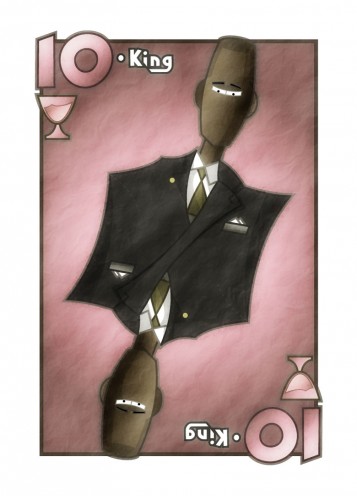Have the beginning of a King of Cups.
As you can surely tell, I started with the King of Coins and made modifications from there. I still need to change the suit, to make it a white tuxedo instead of a black business suit.
I’m not sure if this copying-and-pasting approach is actually faster than starting from scratch. I’ve spent 45 minutes on this so far, which is already quite a bit longer than the 15-30 minutes per face card I was hoping for. Of course, I really have no idea what sorts of expectations to set here, so I’m not going to beat myself up too much about the time spent… this is, after all, a learning process.
I didn’t really sit down and design the cup icon; I just drew something straight in Illustrator really quickly. But I rather like what I ended up with. I think I’ll keep it, with only slight modifications probably.
* * *
While I’m waiting on answers to some questions I had for the client, I thought I’d post some ruminations on what I want to get out of this. And what I want is to do work for precisely the sort of games I don’t like playing.
I like games that are about building stories. Games with memorable characters and places, where after the game, you find yourself joking about the funny or surprising or hero-clobbering plot twists that came up during the game.
These sorts of games tend to have lush, naturalistic illustrations where every picture could be a still from a movie.
I have neither the skills nor the desire to produce this kind of stuff. I like making illustrations that are a little abstract. The sort of illustrations that would be well suited for more abstract games, where your characters aren’t characters so much as ideas represented by people.
My stuff tends to lean towards Art Deco, so this is no real surprise. If you’ve got, say, an Art Deco mural with a bunch of construction workers… those workers aren’t people. They’re the visual manifestation of the idea of hard labor, and the nobility thereof. They’re archetypes. If you’ve got an abstract strategy game where you can summon any number of identical snipers each turn, those snipers aren’t individuals. They’re sort of platonically ideal snipers, and I like it best, from a visual standpoint, when the character portraits for these more abstract games have more abstract art for these kinds of things.
I’d love to have done art for games like Pandemic… there are people, but not really interesting characters you can connect to. I would have loved to have seen some stylized, glorified doctors and engineers in that. That would have been pretty awesome.
Of course, when my board game project gets further along, I’ll want to do more naturalistic illustrations for that since it’s supposed to be story based. Should be an interesting challenge.

So, have you thought about a DIY makeover of a game you really like, such as Pandemic?
Do you designs, have it printed, laminate, etc.. and start playing with your own pieces/parts.
(Though, ahem, I know you don’t need any more projects:) )
The thought has crossed my mind, but ultimately I wouldn’t want to do it, even if I didn’t have so much other stuff to work on. If I’m going to do full boards and card illustrations and whatnot ( as opposed to the relatively minimal amount of time spent on these Scopa cards ), I’d rather invest my time in something fresh that could, at least in theory, be used in a sellable product. Not just for the sales mind you; I don’t care so much about that… it’s more about doing something unique and having that be a better portfolio piece and a better learning experience. Part of design, after all, is having to start with nothing at all and having to decide what approach to take… which is a wholly different endeavor than taking someone else’s work and making revisions to that. Revision isn’t necessarily a skill I need to work on right now.
Not that my track record getting work out there is great, but still, in concept it makes me uneasy since I would very much like to improve that record.